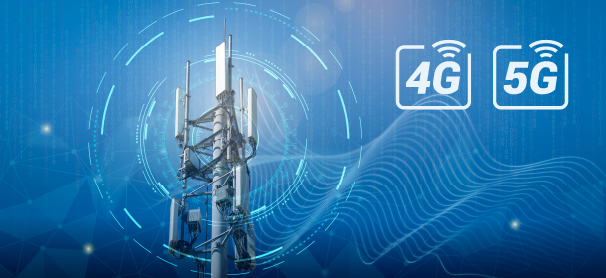Are you developing innovative products that rely on cutting-edge wireless connectivity? 5G technology is crucial for enabling self-driving cars, the Internet of Things (IoT), VR/AR, and more, offering numerous advantages over 4G, including faster data transfer, higher download speeds, and increased capacity. To fully leverage the revolutionary potential of 5G, ensuring compliance through rigorous testing and certification is essential. 360Compliance provides comprehensive 5G device testing services, ensuring your products meet international, regional, and national standards, facilitating a smooth market entry and contributing to the advancement of technology across various industries.
What is 5G?
New innovative products and technologies such as self-driving cars, the Internet of Things (IoT), VR/AP, etc. require better wireless connectivity. 5G technology makes them a reality because this generation of mobile communication has many advantages over 4G:
- More stable connection and transfer of data;
- The higher download speed that is almost 100 times faster than 4g and reaches several Gbps;
- Increased capacity for a single bandwidth that ensures the connection of more equipment and devices simultaneously
This wireless technology allows you to accelerate automation processes, implement AI in workflows, create intelligent factories, and more.
Why is 5G Compliance Testing Essential for Your Business?
The impact of the 5th generation mobile network on the economy and communication will be more revolutionary than any previous generation of mobile communications. Although new devices based on this technology already provide tangible benefits, the potential of this communication type will be fully revealed in the next decade. At the same time, their offer on the global market requires testing 5G and certification confirming compliance with the current international, regional, and national regulations.
Market Requirements
For the 5th generation mobile ecosystem to become a reality, more work needs to be done at the level of governmental agencies. Additional frequency bands are required to ensure uninterrupted network operation. Currently, high-speed broadband access is proposed through the use of mmWave technology. These radio waves include the 24 GHz ‒ 100 GHz spectrum. However, using such technology has some challenges. Proximity to the transmitter tower is necessary as the signal can be easily blocked.
5G Wireless Testing and Certification
If you want to provide goods or services in any segment of the economy based on this revolutionary technology, you need to pass 5G testing and certification. Wireless devices must undergo evaluation to ensure their safety and environmental neutrality for the people using them. Obtaining a certificate confirming compliance with international standards will make it easier and hassle-free to transport your products to the global market. To pass 5G tests, you need to evaluate your products according to the following indicators:
- Radiofrequency (RF)
- Electromagnetic compatibility (EMC)
- Specific absorption rate (SAR)
- Quality of service (QoS), and others
Industries
The wide opportunities provided by 5G contribute to the introduction of innovations in all spheres of human life. In particular, among the leaders in the use of Fifth-generation wireless products are the following industries:
- Medicine
- Automotive
- Urban planning
- Enterprises
- VR/AR Industry
- Household appliances
- IoT products, and many others
Why Choose 360Compliance for 5G Device Testing?
5G compliance testing requires verification of compliance not only with international but also with national standards. 360Compliance team has extensive experience in certifying wired and wireless radio electronic devices for markets in over 195 countries. In addition, we have all permits and licenses for the full cycle certification — from the acceptance and consideration of applications to the examination and issuance of certificates. We will evaluate your products through our network of laboratories. Therefore, when you turn to us for a 5G test, you get a fast, professional, and comprehensive service that will save you from unnecessary fuss and red tape. As technology enthusiasts, we strive to ease the way to consumers for products that accelerate progress and empower humanity such as 5th generation-enabled devices. Call us to start your journey to the market!
Other Certifications

AT&T Certification
Are you looking to launch your telecommunications or wireless devices in the U.S. market? Does the complexity of meeting AT&T’s certification standards seem daunting? At 360Compliance, we understand the intricacies involved in obtaining AT&T certification and are here to simplify the process for you. What is AT&T Certification? AT&T Certification is a rigorous testing and approval process that verifies whether your device meets specific technical and performance standards. This ensures that your device: Operates seamlessly on the AT&T network: This includes compatibility with various network technologies like LTE and 5G, ensuring reliable data and voice transmission. Complies with industry regulations: AT&T Certification verifies compliance with relevant national and international standards, guaranteeing safety and security for users and the network. Delivers optimal performance: Through rigorous testing, AT&T Certification ensures your device meets specific performance benchmarks for factors like battery life, signal strength, and call quality. Which products need AT&T Certification? Any device that transmits data or voice over the AT&T network requires AT&T Certification. This includes: Mobile phones and tablets: Smartphones, basic phones, and tablets all need certification to function on the AT&T network. Internet of Things (IoT) devices: Wearables, connected home devices, and other IoT devices require certification for secure and reliable communication. M2M devices: Machine-to-machine devices that communicate with each other through the network need AT&T device Certification. How to obtain AT&T Certificate? Self-service: This option provides pre-negotiated costs and facilities for PTCRB (PCS Type Certification Review Board) inspection. It's suitable for devices with pre-certified components and a straightforward market launch plan. AT&T Expert Solutions: This comprehensive solution offers hands-on technical support throughout the certification process. It's ideal for complex devices, multi-region launches, or tight market deadlines. Both pathways involve the following steps: Develop a product launch plan: This plan outlines device specifications, objectives, key decision points, and monitoring requirements. Stay updated on regulations: AT&T provides guidance on relevant national and international regulations, including renewal requirements and deadlines. Manage regulatory clearances: AT&T assists with navigating complex clearance procedures for various countries, regulatory agencies, and telecom carriers. Complete testing and validation: Devices undergo rigorous testing to ensure compliance with technical and performance standards. Receive certification: Once all requirements are met, AT&T issues an official certificate for your device. What are the benefits of AT&T Certificate? The introduction of approved wireless components and chipsets which manage data and voice transfers is the most important element of device and network innovation. The variety of choices offered can be confusing, but AT&T is here to assist you. AT&T Certificate Features With AT&T gadget performance analysis and product verification, you can increase your gadget popularity rating, simplify procedures, and minimize costs, implementation issues, and product release duration. Begin with a plan for your product’s release, which sets out all connections, gathers objectives, and identifies critical decision points and monitoring specifications. Ensures up-to-date data on national and institutional accreditation and renewal needs, including methods and deadlines. Manage the difficult clearance procedure for nations, regulatory agencies, and telecom carriers with a turnkey solution. Can substantially reduce device launching time and expenses on any mobile network. Why Choose 360Compliance for AT&T Certification? Navigating the certification landscape can be challenging without the right expertise. Here’s how 360Compliance can assist you: Expert Guidance: Our team has extensive knowledge of AT&T’s certification requirements and procedures. We guide you through every step, from initial application to final approval. Testing and Documentation: We manage all aspects of testing and documentation required for AT&T certification. Speed and Efficiency: We prioritize your time-to-market by streamlining the certification process. Our efficient approach helps reduce delays, allowing you to launch your products faster. Customized Solutions: Whether you are certifying a new device or updating an existing product, we offer tailored solutions to meet your specific needs. Contact us today to learn how we can help you achieve AT&T certification and bring your devices to market faster and with greater assurance.
Learn more
Cellular Testing
Key Components of Cellular Testing Interoperability: Cellular testing ensures that mobile devices can seamlessly connect and communicate with various networks and infrastructure. This is vital for users who may switch between different carriers or travel internationally, as their devices need to function reliably across diverse network environments. Compliance with Standards: Cellular technologies adhere to established standards set by organizations such as the International Telecommunication Union (ITU), 3rd Generation Partnership Project (3GPP), and Global Certification Forum (GCF). Certification ensures that devices comply with these standards, promoting consistency and compatibility across the industry. Network Compatibility: Certification ensures that mobile devices are compatible with specific generations of cellular networks, such as 2G (GSM), 3G (UMTS), 4G (LTE), and the latest 5G technologies. This compatibility is essential for optimal performance and takes into account factors like data speed, latency, and network efficiency. A Step-by-Step Guide to Cellular Certification The cellular certification process is a comprehensive evaluation that mobile devices undergo to ensure compliance with industry standards and regulations. The process includes: Pre-Certification Assessment: Manufacturers begin the process by conducting an internal evaluation of the device's hardware, software, and overall design to identify potential issues. Submission of Documentation: Manufacturers must compile and submit detailed documentation outlining the device's specifications, features, and technical aspects. This documentation typically includes information about the device's hardware components, software architecture, security features, and network compatibility. Laboratory Testing: Rigorous testing for network compatibility, data transmission, voice quality, multimedia performance, and security features. Network Simulation: Devices undergo testing in simulated network environments to evaluate their performance under various network conditions, such as low signal strength or high network traffic. Interoperability Testing: Evaluation of device compatibility with various networks, applications, and services. Security and Compliance Checks: The certification process includes a thorough examination of the device's security features to ensure compliance with industry standards and regulations. Regulatory compliance checks, including safety standards and electromagnetic compatibility, are conducted to meet legal and environmental requirements. Certification Issuance: Awarding of certification upon successful completion of all tests. Post-Certification Support: Manufacturers may need to provide ongoing support, addressing any issues that may arise after certification. This stage involves collaborating with regulatory bodies and network operators to address updates, patches, or new standards that may impact the certified device. Benefits of Cellular Certification Cellular mobile device certification offers a multitude of benefits for both manufacturers and users: Guaranteed Compatibility: Devices that are certified work seamlessly with the network, ensuring reliable and consistent connectivity. Improved User Experience: Users benefit from better call quality, faster data speeds, and a more stable overall mobile experience. Reduced Costs: Manufacturers can save time and money by ensuring their devices are certified before launch, avoiding costly rework or delays. Enhanced Safety: Cellular phone certification ensures devices comply with safety regulations, protecting users and the network infrastructure. Why Choose 360Compliance for Your Cellular Testing Needs? When it comes to cellular testing, 360Compliance stands out as your trusted partner. Our team brings extensive experience in certifying electronic devices for markets spanning over 195 countries. With all the necessary permits and licenses for end-to-end certification, we offer fixed costs from start to certificate, ensuring transparency in pricing. Connect with 360Compliance experts for an initial, free-of-charge consultation, guiding you towards the right strategic approach for a faster time-to-market and a cost-effective solution. Additional Resources: IoT Cellular Certification: Read more Cellular Carrier Certification: Read more CTIA Certification: Read more
Learn more

